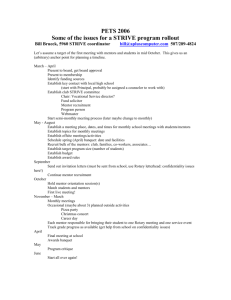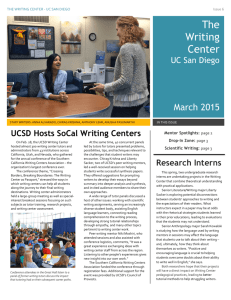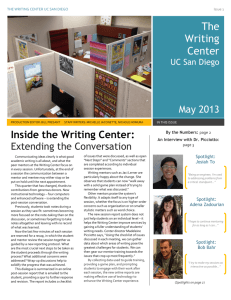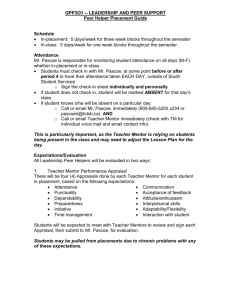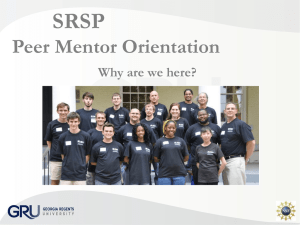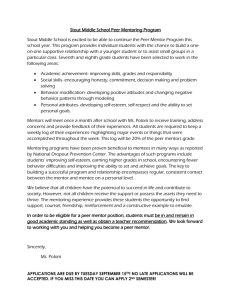May 2015 - the Writing Center!
advertisement
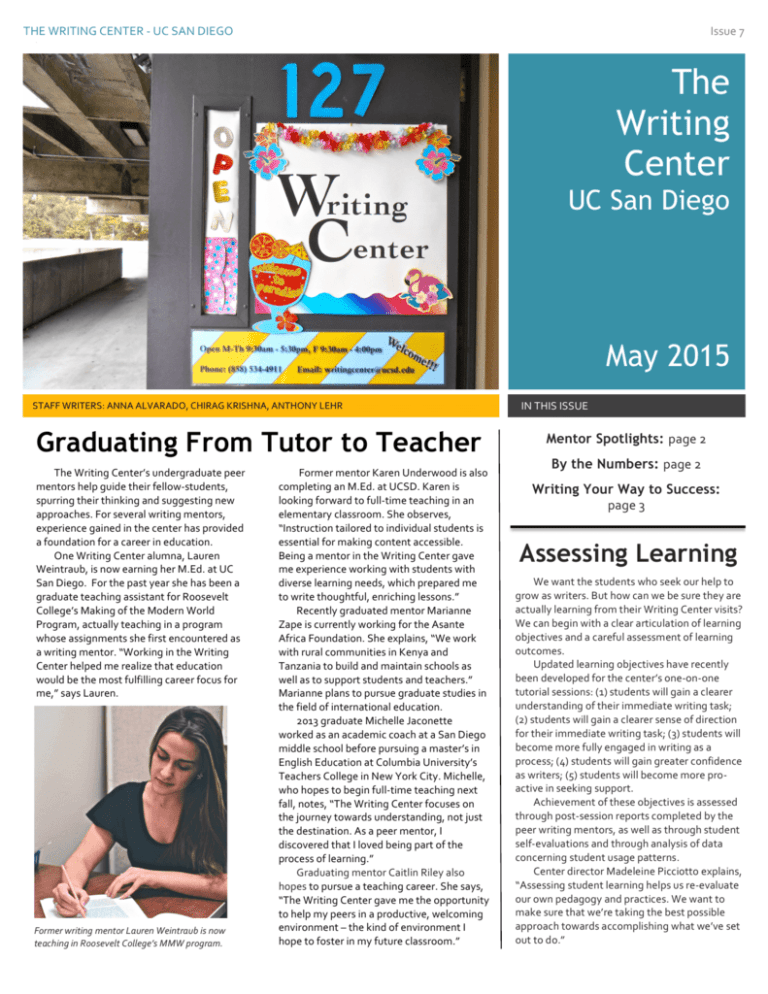
THE WRITING CENTER -­‐ UC SAN DIEGO Issue 7 1 The Writing Center UC San Diego May 2015 STAFF WRITERS: ANNA ALVARADO, CHIRAG KRISHNA, ANTHONY LEHR Graduating From Tutor to Teacher The Writing Center’s undergraduate peer mentors help guide their fellow-­‐students, spurring their thinking and suggesting new approaches. For several writing mentors, experience gained in the center has provided a foundation for a career in education. One Writing Center alumna, Lauren Weintraub, is now earning her M.Ed. at UC San Diego. For the past year she has been a graduate teaching assistant for R0osevelt College’s Making of the Modern World Program, actually teaching in a program whose assignments she first encountered as a writing mentor. “Working in the Writing Center helped me realize that education would be the most fulfilling career focus for me,” says Lauren. Former writing mentor Lauren Weintraub is now teaching in Roosevelt College’s MMW program. Former mentor Karen Underwood is also completing an M.Ed. at UCSD. Karen is looking forward to full-­‐time teaching in an elementary classroom. She observes, “Instruction tailored to individual students is essential for making content accessible. Being a mentor in the Writing Center gave me experience working with students with diverse learning needs, which prepared me to write thoughtful, enriching lessons.” Recently graduated mentor Marianne Zape is currently working for the Asante Africa Foundation. She explains, “We work with rural communities in Kenya and Tanzania to build and maintain schools as well as to support students and teachers.” Marianne plans to pursue graduate studies in the field of international education. 2013 graduate Michelle Jaconette worked as an academic coach at a San Diego middle school before pursuing a master’s in English Education at Columbia University’s Teachers College in New York City. Michelle, who hopes to begin full-­‐time teaching next fall, notes, “The Writing Center focuses on the journey towards understanding, not just the destination. As a peer mentor, I discovered that I loved being part of the process of learning.” Graduating mentor Caitlin Riley also hopes to pursue a teaching career. She says, “The Writing Center gave me the opportunity to help my peers in a productive, welcoming environment – the kind of environment I hope to foster in my future classroom.” IN THIS ISSUE Mentor Spotlights: page 2 By the Numbers: page 2 Writing Your Way to Success: page 3 Assessing Learning We want the students who seek our help to grow as writers. But how can we be sure they are actually learning from t heir Writing Center visits? We can begin with a clear articulation of learning objectives and a careful assessment of learning outcomes. Updated learning objectives have recently been developed for the center’s one-­‐on-­‐one tutorial sessions: (1) students will gain a clearer understanding of their immediate writing task; (2) students will gain a clearer sense of direction for their immediate writing task; (3) students will become more fully engaged in writing as a process; (4) students will gain greater confidence as writers; (5) students will become more pro-­‐ active in seeking support. Achievement of these objectives is assessed through post-­‐session reports completed by the peer writing mentors, as well as through student self-­‐evaluations and through analysis of data concerning student usage patterns. Center director Madeleine Picciotto explains, “Assessing student learning helps us re-­‐evaluate our own pedagogy and practices. We want to make sure that we’re taking the best possible approach towards accomplishing what we’ve set out to d o.” THE WRITING CENTER -­‐ UC SAN DIEGO | Issue 7 2 Mentor Spotlights The 30 peer mentors who currently work at the Writing Center represent a wide range of backgrounds, interests, and experiences. Get to know some of our talented staff! Kevin Yen Sarah Kowalski Ellius Kwok Year: Junior College: Warren Major: General Biology Minors: Health Care, Psychology Favorite hobbies: dancing, drawing, cooking, eating Working as a peer writing mentor offers me an amazing opportunity to m aintain a balance between the natural sciences and the humanities. As a biology major, it's easy to get caught up studying specifics such as the uncoating mechanism of clathrin-­‐coated vesicles or pancreatic acinar cell secretions, and neglect the broader importance of writing and communication. No matter what one's academic or career focus m ay be, it’s undeniably beneficial to be able to write well. I strive to convey this message t o students of any major in the hopes that we can all be well equipped to achieve success. At the W riting Center, I get to work with students with diverse majors on a wide variety of assignments, which constantly challenges me to expand my repertoire of writing styles, structures, and perspectives. Having the opportunity to support and encourage students with their writing assignments day in and day out is one of the most rewarding experiences I've had at UCSD. I‘ve also appreciated the honor of working alongside a phenomenal group of people who share my passion for helping students, as well as many other interests. Year: Senior College: Roosevelt Major: Anthropology Minors: Political Science, Education Studies Favorite hobbies: dancing, reading, writing limericks As an aspiring educator, my experience as a peer writing mentor has been challenging, instructive, and fun! A friend suggested that I apply two years ago, and since I’ve been working here, the great people at the Writing Center have become my closest friends. Going through the MMW series gave me a solid understanding of what it means to be a college-­‐level writer, but I’m constantly amazed by how m uch I learn from the students who make appointments with me. I’ve honed my teaching skills as I’ve helped students address a wide variety of writing issues. It’s really exhilarating to meet with a student who’s working on something new. I’ve also welcomed the opportunity to work as a research intern and to present on writing center topics at various conferences. Just last month I presented at the UCSD Undergraduate Research Conference, discussing my current project which involves discourse analysis of tutorial language. I’m excited about my upcoming graduation and my placement next year in a Boston public school through the City Year program. I know that all I’ve done at the Writing Center has helped to prepare me for my future career in education. Year: Junior College: Revelle Major: Physiology and Neuroscience Favorite hobbies: scuba diving, traveling, trying new foods Initially, the responsibility of guiding students to improve their overall writing skills was daunting. I wondered if I was capable of productively reading other students’ work, or if I would be able to help them at all. But I soon realized that most of the issues students have with writing are common to all of us. Other students’ concerns are often things that I myself have faced. One of my most important goals has been to encourage students as writers and help them build confidence in their abilities. People often view writing papers as very intimidating, and this fear can lead them to believe they lack the capacity to write well. I try to help my fellow-­‐students realize that they’re already well on their way towards having the necessary knowledge and skills to write a good paper. Next year will be my last working at the Writing Center, and I fully intend to maximize my time and reach out to as many students as possible. Seeing the positive feedback we get from satisfied students and the encouraging results as their writing improves is gratifying. It lets me and my fellow m entors know that we’re making a positive impact on our university community. The Writing Center by the Numbers Thus far in the current academic year, 2,151 students have sought one-­‐on-­‐one or group assistance for writing projects in 285 different courses (as of May 11, 2015). Student evaluations of the center’s group workshops have b een consistently high; over the course of the year, workshops have earned a “recommend” rating of 4.75 out of 5. Students report that their Writing C enter visits have helped them to approach their immediate writing tasks productively, with an average rating of 4.65 out of 5 for “I have a clear sense of direction” recorded in post-­‐session evaluations. Many students (53% of all center visitors) have been “repeat customers,” generating a total of 4,841 one-­‐on-­‐one sessions thus far. 285 different courses 4,841 one-­‐on-­‐one sessions 2,151 students this yearso THE WRITING CENTER -­‐ UC SAN DIEGO | Issue 7 3 Reaching Out to the Campus Community Students Speak Out “The Writing Center is really helpful! I‘ve attended group workshops for MMW and received individual attention from the peer writing mentors. I really appreciate the help I’ve gotten here and the progress I’ve made.” Zhihui Huang, Roosevelt College “The writing mentors have offered me excellent advice, and have greatly helped me with HUM papers and research proposals.” Masato Kazumi, Revelle College “The Writing Center is wonderful for papers on all topics. They have a diverse body of peer mentors with great knowledge who can aid you with whatever you need.” Emily Le, Marshall College “The writing mentors are absolutely the nicest people I have ever met on campus. Come to the Writing Center and hang out with cool people while they help you revise your e ssay!” Shuqi Huang, Sixth College “The Writing Center is the best resource for international students like me! Thank you, Writing Center!” Daniel Kim, Muir College Peer mentors Ellius Kwok and Cameron Towne – together with a friend – welcome prospective UCSD students and their families at Triton Day on April 4, 2015. The Writing Center’s main space in Mandeville Center is the “home base” for our operations, but we often go beyond those walls to reach out to the UCSD community at large: from classroom visits to participation in co-­‐curricular events and campus-­‐wide activities. The Writing Center frequently collaborates with other campus units such as the International Center and the Faculty Mentor Program to guide students as they address different writing tasks. For example, on April 8, center director Madeleine Picciotto delivered a presentation about academic email etiquette for Academic Enrichment Programs. Individual faculty members sometimes invite center representatives to speak to their classes about the center’s services and to offer tips for successful writing. Peer writing mentor Nichole Nomura, who visited a Management Science class this quarter, comments, “It’s especially important to d o outreach to courses outside the college writing programs, to let students know we can assist with writing in any discipline.” The Writing Center attempts to connect with students before they even enroll, through participation in such events as Triton Day and Triton Transfer D ay. Peer writing mentor Cameron Towne, who staffed the center’s Triton Day table, says, “I enjoyed meeting future Tritons and presenting the Writing Center as a valuable resource to help in adjusting to the university.” Find out more about the Writing Center at UC San Diego: writingcenter.ucsd.edu facebook.com/ucsdwritingcenter twitter.com/writeUCSD Writing Your Way to Future Success writingcenter@ucsd.edu Peer writing mentor Chirag Krishna helps a student working on a cover letter for a job application. The majority of students who come to the Writing Center seek guidance for academic papers, but as the year progresses we see many who would like help with job cover letters, résumés, CVs, personal statements, and other forms of career and professional writing. Graduating seniors looking ahead to the future are frequent visitors to the center, and we also work with continuing students seeking internships, scholarships, and other opportunities. In addition to group workshops addressing career and professional writing, the center’s peer writing mentors offer one-­‐on-­‐one attention to help students craft documents that highlight their strengths. Students often ask about the difference between a résumé and a CV, or how to provide a clear focus for an application essay – questions the mentors are well equipped to answer. Although other campus resources such as the Career Services Center can provide guidance on career and professional writing, the Writing Center offers a personal, peer-­‐to-­‐peer touch not always found elsewhere. Nathan Cook, a senior who has visited the center for résumé assistance, notes, “The Writing Center provided the spark to get me started on m y résumé. It was something I had been putting off, and the mentor helped put things in an easy-­‐to-­‐understand way.” The center’s peer writing mentors enjoy working with career and professional writing tasks because they often see very tangible results. Writing mentor Liberty Sacker recalls working with a student on an application essay: “She had many interesting things to discuss, so I helped her think about how she could target her material in a m ore focused way. When she came back and told me she had been accepted to t he program, it was extremely gratifying – the best thing about working at the Writing Center is knowing that you’re helping your fellow students.”
